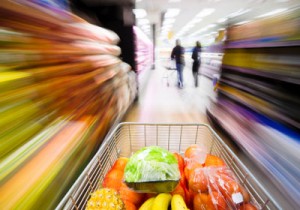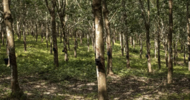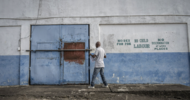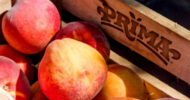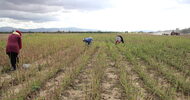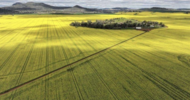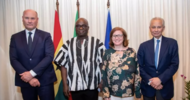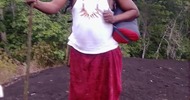Home / Saudi Arabia / Saudi food from Saudi farms ... in Australia?
Saudi food from Saudi farms ... in Australia?
By MICHEL COUSINS | ARAB NEWS
Published: Dec 12, 2010 23:30 Updated: Dec 12, 2010 23:43
JEDDAH: Australian lamb and beef are well known to Saudi shoppers. Both are a regular feature in Saudi supermarkets.
Likewise, Saudis became well aware of Australia and camels thanks to stories in the Saudi media earlier this year about the Australian government wanting to cull its wild camel population and impassioned calls by some Saudi readers for them to be given a home in the Kingdom.
But if former Australian Prime Minister Bob Hawke has his way, Saudis will get to know a great deal more about produce from Down Under — on their dinner plates!
Hawke wants Saudi Arabia to produce its food in Australia. He issued his appeal in Jeddah on Sunday at a meeting of the Australia Gulf Business Council and the Jeddah Chamber of Commerce and Industry (JCCI).
Despite agriculture being part of the old stereotype of the Australian economy, there were, he said, “enormous” opportunities for food cooperation between the two countries. The combination of Saudi capital with Australian land and experience could answer the Kingdom’s quest for food security.
Australia is by no means the first country to offer itself as the place to grow Saudi food. At the Gulf Africa Forum in Riyadh earlier this month, Mozambique and other African nations made similar suggestions.
It is widely known that in its bid to conserve precious water supplies and reduce grain production by 2016, the Kingdom has been looking at ideas of farming elsewhere.
There have already been talks this year on the subject with a number of countries, including the Philippines and Senegal. Just last week, Agriculture Minister Fahd Balghunaim, speaking at a conference in Khartoum, said Saudi investors were interested in developing farming projects in Sudan.
Al-Rajhi Group has already started production in the country, once known as the “Breadbasket of Africa,” and food producer NADEC is also investing there.
The existing Saudi-Australian food trade is based on the traditional system of Australian producers selling to Saudi importers. The notion of Saudi companies producing food in Australia for the Saudi market would be a novel departure.
In welcoming Hawke and the trade mission to Jeddah at the end of an eight-day tour of GCC states, JCCI’s Vice Chairman Mazen Batterjee backed an increase in bilateral trade with Australia, worth $2 billion last year.
“It needs an extra effort from all of us,” he told the meeting. He supported not only more Saudi-Australian joint ventures but also Saudi investment in Australian agriculture. Saudi businessmen are “looking to establish joint ventures with you,” he told the Australian business group, noting that both the public and private Saudi sectors had a $2.8 billion budget to invest in food production abroad. This was the first trade mission to the region by the Australia Gulf Business Council.
Founded in April 2009 by Bob Hawke, Peter Costello, who served as Australia’s treasurer from 1996 to 2006, Michael Yabsley, who serves as its chief executive, and Alastair Walton of Australian bankers BKK, the council sees itself as an instrument for facilitating major joint ventures between Australian and GCC corporations and institutions and investment in both directions.
That was reflected in the membership of the mission. Looking for investment partners, Melbourne-based NewSat is planning to launch a satellite that will cover the Gulf region and is looking for $10 billion in capital investment. Another company R.M. Williams Agriculture Holdings, is looking for $1 billion investment.
Those involved said it has been a profitable if intensive tour.
Arab News | Dec 12, 2010
By MICHEL COUSINS | ARAB NEWS
JEDDAH: Australian lamb and beef are well known to Saudi shoppers. Both are a regular feature in Saudi supermarkets.
Likewise, Saudis became well aware of Australia and camels thanks to stories in the Saudi media earlier this year about the Australian government wanting to cull its wild camel population and impassioned calls by some Saudi readers for them to be given a home in the Kingdom.
But if former Australian Prime Minister Bob Hawke has his way, Saudis will get to know a great deal more about produce from Down Under — on their dinner plates!
Hawke wants Saudi Arabia to produce its food in Australia. He issued his appeal in Jeddah on Sunday at a meeting of the Australia Gulf Business Council and the Jeddah Chamber of Commerce and Industry (JCCI).
Despite agriculture being part of the old stereotype of the Australian economy, there were, he said, “enormous” opportunities for food cooperation between the two countries. The combination of Saudi capital with Australian land and experience could answer the Kingdom’s quest for food security.
Australia is by no means the first country to offer itself as the place to grow Saudi food. At the Gulf Africa Forum in Riyadh earlier this month, Mozambique and other African nations made similar suggestions.
It is widely known that in its bid to conserve precious water supplies and reduce grain production by 2016, the Kingdom has been looking at ideas of farming elsewhere.
There have already been talks this year on the subject with a number of countries, including the Philippines and Senegal. Just last week, Agriculture Minister Fahd Balghunaim, speaking at a conference in Khartoum, said Saudi investors were interested in developing farming projects in Sudan.
Al-Rajhi Group has already started production in the country, once known as the “Breadbasket of Africa,” and food producer NADEC is also investing there.
The existing Saudi-Australian food trade is based on the traditional system of Australian producers selling to Saudi importers. The notion of Saudi companies producing food in Australia for the Saudi market would be a novel departure.
In welcoming Hawke and the trade mission to Jeddah at the end of an eight-day tour of GCC states, JCCI’s Vice Chairman Mazen Batterjee backed an increase in bilateral trade with Australia, worth $2 billion last year.
“It needs an extra effort from all of us,” he told the meeting. He supported not only more Saudi-Australian joint ventures but also Saudi investment in Australian agriculture. Saudi businessmen are “looking to establish joint ventures with you,” he told the Australian business group, noting that both the public and private Saudi sectors had a $2.8 billion budget to invest in food production abroad. This was the first trade mission to the region by the Australia Gulf Business Council.
Founded in April 2009 by Bob Hawke, Peter Costello, who served as Australia’s treasurer from 1996 to 2006, Michael Yabsley, who serves as its chief executive, and Alastair Walton of Australian bankers BKK, the council sees itself as an instrument for facilitating major joint ventures between Australian and GCC corporations and institutions and investment in both directions.
That was reflected in the membership of the mission. Looking for investment partners, Melbourne-based NewSat is planning to launch a satellite that will cover the Gulf region and is looking for $10 billion in capital investment. Another company R.M. Williams Agriculture Holdings, is looking for $1 billion investment.
Those involved said it has been a profitable if intensive tour.


